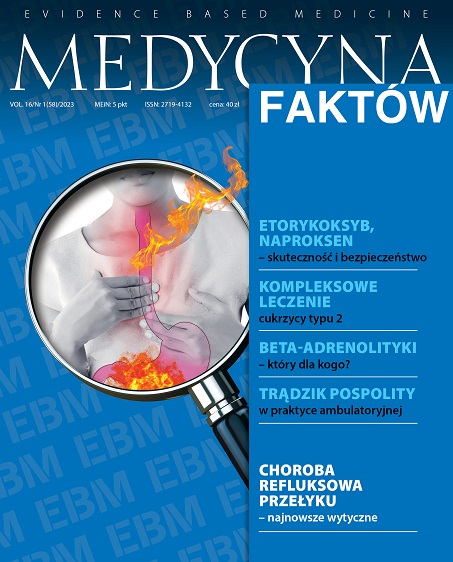The cardiovascular safety of etoricoxib Case report
Main Article Content
Abstract
Etoricoxib is a highly selective inhibitor of cyclooxygenase 2 indicated for the relief of the symptoms of osteoarthritis, rheumatoid arthritis, and pain and signs of inflammation associated with acute gouty arthritis. Selective non-steroidal anti-inflammatory drugs such as etoricoxib were the result of efforts to design non-steroidal anti-inflammatory drugs that, through a mechanism that spares cyclooxygenase 1, would reduce the risk of gastrointestinal toxicity. This study presents two clinical cases illustrating the role of etoricoxib in the treatment of osteoarthritis and rheumatoid arthritis with particular emphasis on possible cardiologic adverse effects, as well as guidance in decision making when prescribing a selective cyclooxygenase 2 inhibitor.
Article Details
Copyright © by Medical Education. All rights reserved.
References
2. Mallen SR, Essex MN, Zhang R. Gastrointestinal tolerability of NSAIDs in elderly patients: A pooled analysis of 21 randomized clinical trials with celecoxib and nonselective NSAIDs. Curr Med Res Opin. 2011; 27: 1359-66.
3. Kocot-Kępska M. Etorykoksyb – nowe możliwości leczenia bólu. Skuteczność i bezpieczeństwo terapii (access: 24.01.2023).
4. Pawliczak R. Celekoksyb – nowe spojrzenie, nowe korzyści. Terapia. 2014; 12: 70-7.
5. Laine L, Curtis SP, Cryer B et al; MEDAL Steering Committee. Assessment of upper gastrointestinal safety of etoricoxib and diclofenac in patients with osteoarthritis and rheumatoid arthritis in the Multinational Etoricoxib and Diclofenac Arthritis Long-term (MEDAL) programme: a randomised comparison. Lancet. 2007; 369: 465-73.
6. van Walsem A, Pandhi S, Nixon RM et al. Relative benefit-risk comparing diclofenac to other traditional non-steroidal anti-inflammatory drugs and cyclooxygenase-2 inhibitors in patients with osteoarthritis or rheumatoid arthritis: a network meta-analysis. Arthritis Res Ther. 2015; 17: 66.
7. Combe B, Swergold G, McLay J et al. Cardiovascular safety and gastrointestinal tolerability of etoricoxib vs diclofenac in a randomized controlled clinical trial (The MEDAL study). Rheumatology (Oxford). 2009; 48: 425-32.
8. Cannon CP, Curtis SP, FitzGerald GA et al; MEDAL Steering Committee. Cardiovascular outcomes with etoricoxib and diclofenac in patients with osteoarthritis and rheumatoid arthritis in the Multinational Etoricoxib and Diclofenac Arthritis Long-term (MEDAL) programme: a randomised comparison. Lancet. 2006; 368: 1771-81.
9. Song GG, Seo YH, Kim JH et al. Relative efficacy and tolerability of etoricoxib, celecoxib, and naproxen in the treatment of osteoarthritis: A Bayesian network meta-analysis of randomized controlled trials based on patient withdrawal. Z Rheumatol. 2016; 75: 508-16.
10. Moore RA, Moore OA, Derry S et al. Responder analysis for pain relief and numbers needed to treat in a meta-analysis of etoricoxib osteoarthritis trials: bridging a gap between clinical trials and clinical practice. Ann Rheum Dis. 2010; 69: 374-9.
11. European Medicines Agency. Question and answers on the review of etoricoxib – containing medicines. Doc. Ref. EMEA/329177/2008.
12. Zacher J, Feldman D, Gerli R et al; etoricoxib OA study group. A comparison of the therapeutic efficacy and tolerability of etoricoxib and diclofenac in patients with osteoarthritis. Curr Med Res Opin. 2003; 19: 725-36.
13. Kurbiel A, Kocot-Kępska M, Przeklasa-Muszyńska A. Niesteroidowe leki przeciwzapalne do stosowania powierzchniowego w leczeniu choroby zwyrodnieniowej stawów – skuteczność i bezpieczeństwo etofenamatu. Ortopedia i Traumatologia. 2019; 2.
14. Contreras AE, Cervantes VM, Collantes-Esteves E. Update on the clinical pharmacology of etoricoxib, a potent cyclooxygenase-2 inhibitor. Future Rheumatol. 2007; 2: 545-65.
15. Piirainen A, Kokki M, Hautajärvi H et al. The Cerebrospinal Fluid Distribution of Postoperatively Administred Dexketoprofen and Etoricoxib and Their Effect on Pain and Inflammatory Markers in Patients Undergoing Hip Arthroplasty. Clin Drug Investig. 2016; 36: 545-55.
16. Moss P, Benson HAE, Will R et al. Fourteen days of etoricoxib 60 mg improves pain, hyperalgesia and physical function in individuals with knee osteoarthritis: a randomized controlled trial. Osteoarthritis Cartilage. 2017; 25: 1781-91.
17. Nor Azlin MI, Maryasalwati I, Norzilawati MN et al. The efficacy of etoricoxib vs mefenamic acid in the treatment of primary dysmenorrhoea: a randomised comparative trial. J Obstet Gynaecol. 2008; 28: 424-6.
18. Daniels SE, Bandy DP, Christensen SE et al. Evaluation of the dose range of etoricoxib in an acute pain setting using the postoperative dental pain model. Clin J Pain. 2011; 27: 1-8.
19. Clarke R, Derry S, Moore RA. Single dose oral etoricoxib for acute postoperative pain in adults. Cochrane Database Syst Rev. 2012; CD004309.
20. Maquirriain J, Kokalj A. Acute Achilles tendinopathy: effect of pain control on leg stiffness. J Musculoskelet Neuronal Interact. 2014; 14: 131-6.
21. Zhang S, Zhang Y, Liu P et al. Efficacy and safety of etoricoxib compared with NSAIDs in acute gout: a systematic review and a meta-analysis. Clin Rheumatol. 2016; 35: 151-8.
22. Lin TM, Chi JE, Chang CC et al. Do etoricoxib and indometacin have similar effects and safety for gouty arthritis? A meta-analysis of randomized controlled trials. J Pain Res. 2018; 12: 83-91.
23. Brooks P, Kubler P. Etoricoxib for arthritis and pain management. Ther Clin Risk Manag. 2006; 2: 45-57.
24. opis odsyłacza (access: 24.01.2023).
25. Gottesdiener K, Schnitzer T, Fisher C et al; Protocol 007 Study Group. Results of a randomized, dose-ranging trial of etoricoxib in patients with osteoarthritis. Rheumatology (Oxford). 2002; 41: 1052-61.
26. Walker C, Biasucci LM. Cardiovascular safety of non-steroidal anti-inflammatory drugs revisited. Postgrad Med. 2018; 130: 55-71.
27. Sattar N, McCarey DW, Capell H et al. Explaining how “high-grade” systemic inflammation accelerates vascular risk in rheumatoid arthritis. Circulation. 2003; 108: 2957-63.

